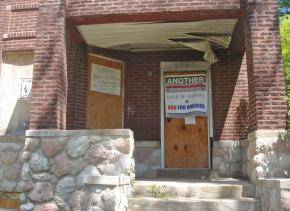Chicago’s foreclosure epidemic
The residents of Chicago's Austin neighborhood have pleaded with banks to help them stay in their homes, to little effect. Now they're going public, reports .
CHICAGO--In the Austin neighborhood on the city's far west side, 14 houses in a single block are in foreclosure. Several are boarded up, and the lawns have turned into small overgrown fields. At least 28 families have been displaced from these homes.
Other foreclosures are not so obvious. In some cases, families were forced out before they even had time to move, and their houses sit fully furnished, waiting to be broken into.
Austin residents and community organizers gathered June 30 to give tours of the devastation and speak to the media. The event was part of a national tour put on by National People's Action to expose the impact of home foreclosures brought on by Bank of America, which--along with its subsidiary banks--is currently the loan collector of one in every four home mortgages in the country.
According to a report released by National People's Action, Bank of America has initiated 1,700 home foreclosures in Chicago in the first six months of 2010 alone and is the largest owner of repossessed properties in the city. In 2009, Bank of America was responsible for 17 percent of Chicago's 23,000 foreclosure filings.

The community of Austin has been especially hard hit by the recession and is currently burdened with the highest home foreclosure rate in Chicago. Looking around the neighborhood, it is not hard to see the evidence. In a single city block, our tour guides point out 14 different houses that are in foreclosure and explain that at least 28 families have been displaced from these homes.
On nearby blocks, entire large apartment buildings have been repossessed. "What does it do to a community when a 50-unit apartment building is foreclosed on?" asked Rev. Sirchester Jackson as he introduced the press conference. "Kids can't go to the same schools, and homes are surrounded by vacant lots."
Local residents Antonio Hill and Terrence Johnson, both members of the South Austin Coalition Community Council (SACCC), describe the spike in violence that has recently hit the neighborhood. "These vacant houses are used by drug dealers, and there's an elementary school right around the corner," explains Hill. "Our kids have to walk through here every day." Johnson points to buildings that used to be churches and community centers, but are now abandoned and deteriorating.
All of this has taken a significant toll on the property values in the neighborhood. "For sale" signs hang outside many of the vacant homes, but Hill says that for most of them, the prospects of selling are slim. Those Austin residents who still own their homes must continue to struggle to pay off inflated mortgages while they watch their property values plummet.
BANK OF America is certainly not the only bank responsible for the foreclosures in the neighborhood, and the speakers at the event emphasized that all banks must be held accountable.
Nevertheless, Bank of America instigates more foreclosures in the neighborhood than any other bank, and residents feel that it has an obligation to give back to the communities that helped to bail it out a year ago.
So far, Bank of America has done nothing to help these people. Many homeowners who are struggling to keep up with their mortgages have been trying to get the terms of their loans modified but have had little luck.
SACCC representative Theresa Welch-Davis told the story of 78-year-old Dorothy Daniels, who was unable to make it to the press conference because of health problems. Dorothy has lived in her home in South Austin for 40 years and has never missed a payment on her mortgage, but has been struggling to keep up.
Two years ago, Dorothy reached out to Bank of America, the servicer on her mortgage, to get the terms of her loan modified. After sending in her application seven times and getting rejection notices again and again because of supposedly incomplete forms and lost paperwork, she finally received a temporary loan modification last month. She still has not been approved for a permanent loan modification, and she continues to live in fear of losing her home.
Unfortunately, Dorothy's case is not unusual. Many Austin homeowners have tried to petition Bank of America for help before they miss mortgage payments, but have found that the bank refuses to act until it is too late. By that time, the residents are already behind, and Bank of America's response is to kick them out.
While the situation certainly looks bleak, residents are starting to get organized around the issue. SACCC has joined with other community organizations to fight against the foreclosures. They are demanding that Bank of America allow all residents, including those who have already been kicked out, to keep their homes. In addition, they ask that the vacant houses and plots of land be returned to the community to help the increasing numbers of homeless and unemployed in the neighborhood.
Looking ahead, Hill stresses the need for all residents, including those who are not yet in danger of facing foreclosure, to join together. "We are tired of sitting and watching homes get taken away," said Hill. "We need to fight back for ourselves, and to teach our kids not to let themselves get taken advantage of."


